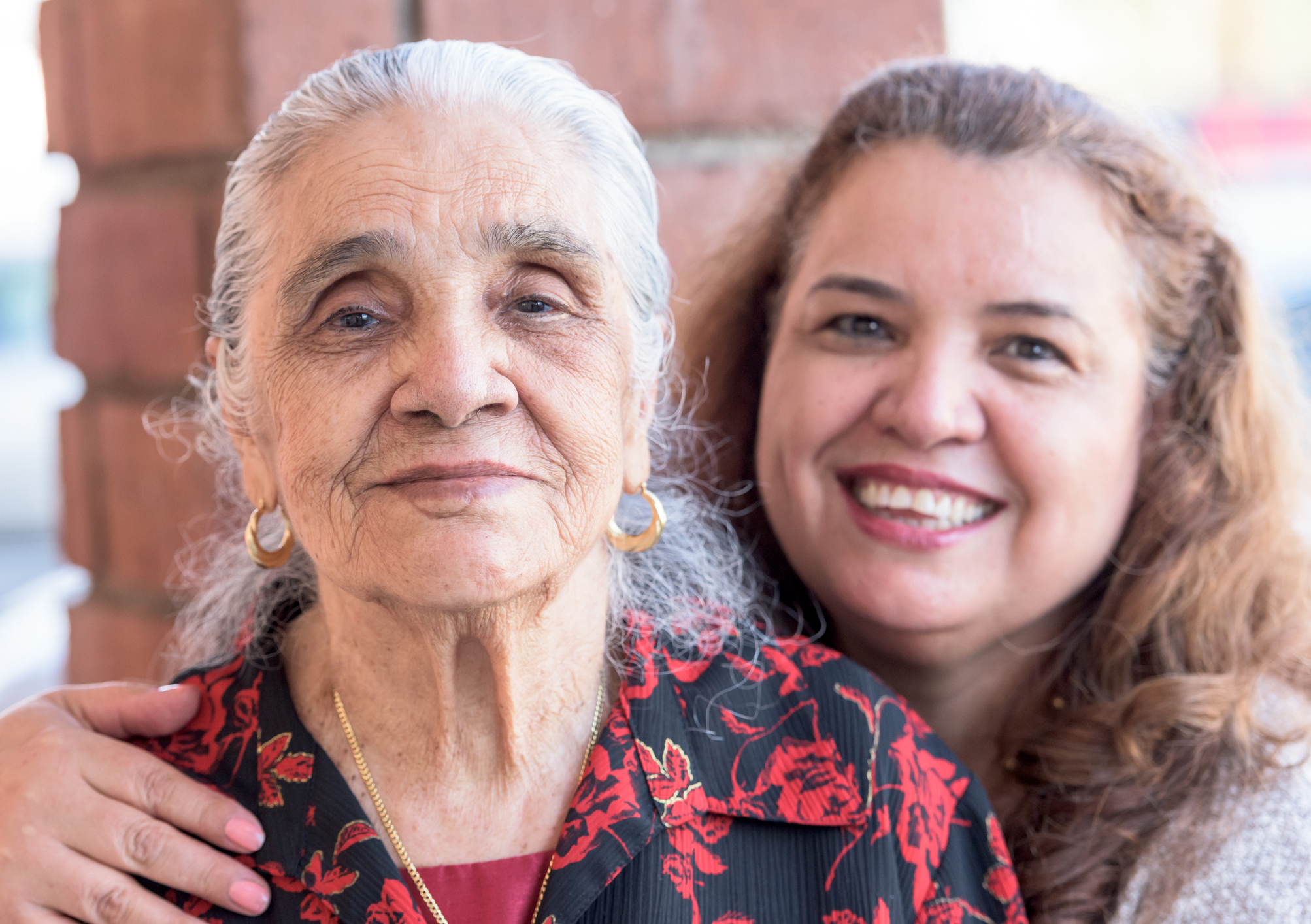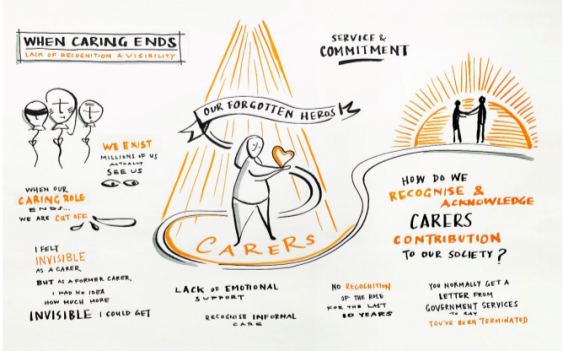Precarious lives: the urgent need to support informal, unpaid carers for life after caring
Understanding how caring ends is integral for improving support for carers, says an expert from UNSW’s Centre for Social Research in Health.
Understanding how caring ends is integral for improving support for carers, says an expert from UNSW’s Centre for Social Research in Health.

Nyrie* lives with and cares for her partner and parent. Her parent has ageing-related frailty; her partner has a physical disability and a terminal illness. “I love being a carer. It’s a role suited to me,” she says.
“[But] I dislike being so poor, [and the] constant financial anxiety ... The fear I’ll give my all to these two now but will have a poor lonely old age myself. No super to afford a decent retirement, no current recognised skills so I can earn a living.”
Nyrie is one of more than 2.65 million people in Australia who provide informal, unpaid care to a family member or friend living with disability, a long-term health condition, terminal illness, or frailty. The average carer provides care for 12 years.
Informal carers make substantial social and economic contributions to communities, yet, for many, transitioning out of caring is financially, socially and personally challenging, says Scientia Associate Professor Emma Kirby from the UNSW Centre for Social Research in Health.
“The health and social impacts experienced by former carers are wide-ranging, including poor health, loneliness, limited employment opportunities, and financial precarity,” she says. “Yet, support for former carers is lacking.”
Existing policy, services, and entitlements, such as they are, tend to focus on current carers, and often don’t include those ‘post-caregiving’, she says. “Our research has revealed how much current carers worry about how their caring will end in the future,” says the expert in sociology of health, illness and care.
“A lot of people can't see a future. They can't even imagine a future … They're afraid of what's going to happen, to the person that they care for, and to themselves.”
The number of carers facing precarious and uncertain futures after their caring ends will dramatically increase in coming years with demand for informal carers estimated to be 16 per cent greater than supply by 2030.
“There is an urgent need to recognise the ways in which transitions out of caring are experienced to understand how to better support and prepare carers for life beyond caring,” she says.
“A lot of people can't see a future. They can't even imagine a future … They're afraid of what's going to happen, to the person that they care for, and to themselves,” says A/Prof. Kirby.
A/Prof. Kirby’s research focuses on relationships and health care, health care practice, diversity and social justice. She is leading world-first research into the conditions in which caring ends, together with Professor Christy Newman and Professor Iva Strnadová from UNSW Arts, Design & Architecture, Dr Brendan Churchill from the University of Melbourne and Dr Louisa Smith from Deakin University.
The project, When caring ends: Understanding and supporting informal care trajectories, foregrounds carers’ voices to improve our understandings of how, why, when, and for whom caring ends, as well as the ways socio-cultural expectations shape carers’ experiences. It draws together interdisciplinary expertise across sociology, social policy, disability studies, and education.

“Our systems don’t tend to recognise interdependence and relationality very well – what often gets lost in these discussions is how much carers and care recipients rely on each other. So when caring ends, there can be challenges that are unforeseen,” explains A/Prof. Kirby. Image: Vivien Sung.
“We understand how hard carers work to sustain their caring, and the value carers bring to our communities,” A/Prof. Kirby says. “Learning from the experiences of carers – who have developed skills, capacities and insights that remain under-recognised or undervalued – is of considerable benefit in informing responses to care needs in the future.”
Funded by an ARC Linkage grant, the project is a partnership between UNSW Sydney, the University of Melbourne, Deakin University and peak bodies Carers NSW and Carers Victoria. It moves across care relationships, life stages and contexts, as well as service sectors to provide a comprehensive analysis of former carers’ unmet needs.
The project developed from research into responses to the Carers NSW 2020 National Carer Survey, and a pilot study with focus group discussions with carer representatives and front-line carer support staff in partnership with Carers NSW, exploring current and former carers’ concerns, opportunities and preferences around care endings.
"We hope to improve the lives of carers, and help to normalise talking about, and preparing for, the end of caring," says A/Prof. Kirby.
The pilot identified key focus areas that will be explored: financial and work impacts; social and cultural expectations; recognition and visibility; and ongoing roles and identities.
The project will provide an evidence base to inform improvements in the delivery and provision of support and entitlements, help carers plan and prepare for sustainable futures, and improve recognition and visibility of current and former carers.
“Inevitably, all informal caring comes to an end, though the circumstances may vary. For example, the person being cared for may recover or improve, other people may take over caring duties, or caring might end in bereavement,” says A/Prof. Kirby.
“All of these pathways out of caring can be challenging and lack visibility. We hope to improve the lives of carers, and help to normalise talking about, and preparing for, the end of caring.”
Our expectations about caring are shaped by socio-cultural norms, says A/Prof. Kirby. “Often, expectations are gendered. [The average carer is 58 years old and female]. It’s assumed that women are naturally skilled at being caring, that they want to be carers, that everyone has the capacity to care and therefore do caring work,” she says.
We assume that people are equipped to re-engage with the community, however, transitioning out of caring often comes with significant life change, she says. Carers can experience changes to their day-to-day routine, their financial wellbeing, and housing, often at a time of profound loss. This makes re-engaging with social networks and employment opportunities very complicated, she says.
“There are also challenges related to more universal experiences of identity and belonging and purpose: how do I now find my way in the world? What is my role or purpose now? And of course, for some people there are better opportunities than for others,” she says.
Re-entering the labour market can be compounded by intersectional disadvantages, unconscious bias within the employment sector, and a lack of recognition for managerial and other skills associated with caring, she says.
“Put simply, caring costs. In this way, how caring ends represents much more of a problem than simply one of individual choices or attempts to navigate life transitions,” she says. “How pathways out of caring are experienced is mediated by social relations and structural factors, including one’s position in the community, for example, gender, generation, socio-economic status, education.”
Research has shown that carers experience social isolation and loneliness, “so how do we help former carers reintegrate into relationships, into society, into friendships and romantic relationships and so on?” she says.
Issues such as interdependence within the caring context can also complicate these transitions. “Our systems don’t tend to recognise interdependence and relationality very well – what often gets lost in these discussions is how much carers and care recipients rely on each other. So when caring ends, there can be challenges that are unforeseen.”
Laid on top of this are social taboos associated with endings. “We can't talk about endings. We find them difficult to discuss. We associate ending caring roles with things like abandonment, giving up, or not caring enough,” she says.
“Saying, we need to talk about the future in terms of caring roles can sometimes imply ‘I don't really want to do this, I don't love you enough’, which is so often very far from the reality,” she says. “Carers often make huge compromises in order to sustain their caring. This can make transitions really difficult interpersonally, as well as resulting in endings that are driven by crisis rather than preparation.”
The research team will use a mixed-methods approach to bring together longitudinal analysis of the National Carers Survey, in-depth interviews with current carers, workshops with former carers (exploring timeline mapping of their history and imagined futures), and focus groups with key stakeholders to develop new knowledge on the meaning and experience of care and caring.
They will also produce training modules for peak bodies and a podcast series for carers covering different aspects of care ending with featured experts, discussing housing, superannuation, work, and pathways.
The project will make experiences of how caring ends visible to the broader community and to government, A/Prof. Kirby says. “But it will also normalise the inevitability of endings. If every caring relationship has to come to an end, if we can acknowledge that inevitability, we should be able to better prepare for endings and have pipelines for people moving beyond those experiences to new futures.”